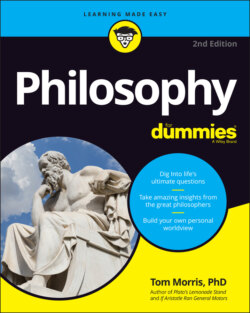Читать книгу Philosophy For Dummies - Tom Morris - Страница 62
Radical skepticism about the future
ОглавлениеIt’s necessary to take at least the briefest of glances at beliefs about the future. The skeptic’s radical hypothesis here is one invented by a philosopher friend I often saved from the bumpers of oncoming cars in New Haven, Connecticut, years ago (when he wasn’t saving me, as we theorized our way down the sidewalks around Yale), contemporary philosopher and profound thinker J.L.A. Garcia. It’s called Futuristic Nihilism and is very simple.
The futuristic nihilist points out that the future does not exist. Yet. But there is a problem. In order for a belief to be true, the object about which it is true must be among the furniture of reality, the sum total of things that exist, and that object must have the property attributed to it in that belief. For it to be true that grass is green, there must be such a thing as grass, and it must have the property of being green. But the future is right now just one huge void. You may pour into that void lots of beliefs about what will happen later today, what will transpire tomorrow, and what will occur later this year. You likely hold beliefs about the next decade. You may be deep into many beliefs about the future, however tentative and cautious you might try to be with this territory. But the future does not yet exist to have any qualities or ground any truths. And that applies to the very near future, including beliefs you have about stuff an hour from now, or tomorrow. Those times don’t yet exist.
The future-oriented radical skeptic could buttress his argument even further by plugging in to some of the other forms of radical skepticism. Think about the radical hypotheses of the previous section. At any second, you could wake up from Descartes’ Dream and find things in the immediate future to be very different from what you might have inductively inferred, based on a delusory past. Or Descartes’ Demon could snap his fingers and wake you up to an extremely divergent present and future from anything you expect. The deception could change radically. How do you know any of this won’t happen any minute now and pull the rug out from under your future-oriented beliefs? To this question there is no good answer. And that’s really very odd. You may get to this point in our journey and understand in a new way the poet Coleridge’s words when he wrote: “My mind is in a state of philosophical doubt.” And, yeah: Ouch.
